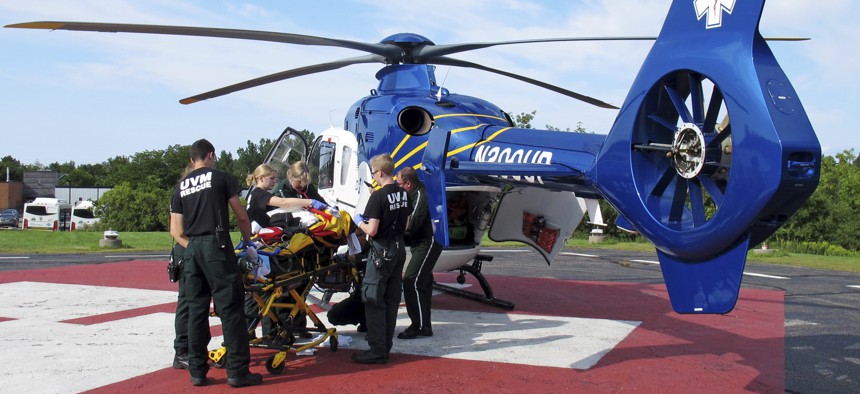Feds Reject Wyoming’s Plan to Regulate Air Ambulance Transport

Emergency workers off load a patient from a helicopter at the University of Vermont Medical Center in Burlington, Vt., Thursday 23, 2018. AP Photo/Wilson Ring

Connecting state and local government leaders
The state had requested a Medicaid waiver as part of a plan to reduce air ambulance costs and to improve service availability.
The Centers for Medicare and Medicaid Services this month rejected a proposal that Wyoming health department officials hoped would allow the state to rein in the high cost of air ambulance service.
Concerned about high costs and uneven access to air ambulance transport, Wyoming health officials had sought approval from CMS to regulate the industry like a public utility and expand Medicaid coverage to all state residents for the specific benefit of ambulance transportation by air.
Industry estimates put the nationwide cost of average air ambulance transport at $11,000 per trip, but costs to patients can range much higher. Privately-insured patients were charged an average of $36,400 for helicopter transport and $40,600 for fixed-wing transport in 2017, according to a recent report from the federal Government Accountability Office.
In its waiver request, Wyoming estimates that about 4,000 people were taken to the hospital by air ambulance in 2018. Approximately 90% of those patients do not have to pay for the cost of transport because of insurance coverage. For the remaining 10% of patients, the average out-of-pocket cost per flight is $2,250. But out-of-pocket costs have reached upwards of $40,000 in a handful of cases, the state said.
The state said that its proposal would have allowed Medicaid to determine statewide requirements for air ambulance coverage, issue competitive bids for providers and establish a centralized call center that would direct air ambulance traffic. The price for transport would likely have been lowered through the competitive bidding process, the state said.
In a January 3 letter rejecting the proposal, CMS said Wyoming’s plan “does not align with the core objectives of Medicaid.”
“Using the Medicaid administrative structure to provide services to other individuals in the state as a mechanism to avoid the application of federal aviation law is a clear departure from the core, historical mission of the Medicaid program to provide health coverage to the Medicaid eligible population,” wrote Calder Lynch, the acting deputy administrator and director of CMS.
CMS also took issue with the potential costs of the plan, saying the state’s proposal does not indicate that it “is or would ever be budget neutral.”
Air ambulance transport has expanded in remote areas of the country, particularly in regions where rural hospitals have closed, leaving large gaps in service coverage.
Approval of the Wyoming waiver could have opened the door for other states with similar issues to pursue similar solutions.
Despite the denial of the waiver proposal, a spokeswoman for Wyoming’s Department of Health said officials are continuing to explore ways to address the problem in the rural state.
“Working with our state's policymakers, we will evaluate our options for potential next steps,” spokeswoman Kim Deti wrote in an email statement. “No decisions have been made at this point. However, the issues that drove our application remain a concern.”
Andrea Noble is a staff correspondent for Route Fifty.

NEXT STORY: A Nebraska Law Bans People with STDs from Marrying. A Lawmaker Wants to Scrap It




